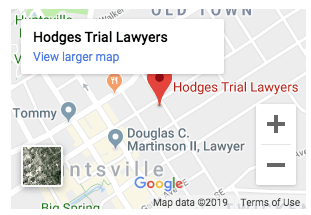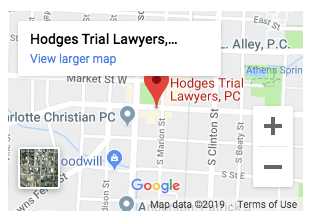Motorcycle Accident Lawyers in Huntsville, AL
Many Americans enjoy riding on a motorcycle. Tragically, in accidents involving motorcycles, the rider is often thrown from the bike, resulting in devastating injuries. The same wreck that might cause only relatively minor injuries to a passenger in a car can cause life-altering or fatal injuries to a motorcycle rider. According to the National Highway Traffic Safety Administration (NHTSA), the rate of fatalities per vehicle miles traveled is nearly 28 times higher for motorcyclists when compared to passenger car occupants. Non-fatal injuries can include dislocated bones or limbs, abrasions, spinal injuries, and even paralysis.
Approximately 80 percent of all motorcycle crashes result in injuries or death. A study by the Government Accounting Office found that motorcycle crashes cost $16 billion in 2010 alone. You may incur debt involving medical transportation, emergency services, hospital care, rehabilitation, and property damage. Although motorcycle helmets reduce fatalities by 30 percent, a helmet cannot prevent all injuries that might occur if you are thrown from the bike.
Common Causes of Motorcycle Accidents
Alabama has specific laws regarding motorcycle safety. All motorcyclists and their passengers are required to wear a helmet regardless of age. A motorcycle endorsement on your license is necessary for riders age 16 and older. To get the motorcycle endorsement, you must pass a written test or complete a motorcycle safety course. However, no matter how defensively you drive, it is impossible to have complete control over your driving environment. Many motorcycle accidents are the result of driver error, including the following:
- Failure to see a motorcycle when making turns. Left turns are especially dangerous because motorcycles often get caught in the blind spot, leading to a head-on collision.
- Failure to notice the motorcycle when changing lanes. This is a blind spot accident that can be avoided.
- Not allowing enough space between vehicles. A motorcycle can stop quickly because it weighs far less than a car, and a vehicle traveling at high speeds can hit a stopped motorcycle under emergency braking.
- Speeding. This factor has caused numerous accidents for both car drivers and motorcyclists.
- Drunk driving or drugged driving. Impaired reflexes make it difficult to react to a motorcycle that you could not see before you started drinking.
- Distracted driving. Any action that takes one’s attention off the road is highly dangerous and can lead to fatal injuries in a collision.
- Age. The NHTSA found that 56 percent of riders killed in accidents were aged 40 or older. If you factor in injuries, the 20 to 29 age bracket is more likely to be involved in an accident, but it is no surprise that your reflexes and vision worsen as you get older. Older riders must be more careful, and in some cases, you must be willing to stop riding for your own safety.
- Lack of experience. As mentioned above, all riders must have the motorcycle certification if they are aged 16 and older. Young or inexperienced riders tend to take more risks, and that can be dangerous on an already unstable vehicle.
- A lack of anti-lock brakes. One side controls the front brakes, and one side controls the back brakes; if the brakes are not applied evenly, you could be thrown from the bike. If the brakes lock up, you will skid into any obstacle you wanted to avoid.
Defective roads are dangerous for all motorists, but even more so for motorcyclists and others on two wheels, as two-wheeled vehicles are far less stable. There is no feature on your bike that will give you more traction if there is snow or ice. Rain is much more slippery when you have two wheels, and raindrops can obscure your vision. In addition, wind can push you into another vehicle if you are not careful.
Inadequate banking of curves, potholes, and debris can cause a motorcycle accident and its accompanying injuries. As a car driver, you must be aware of how motorcycles will behave on the road. As a motorcyclist, you know that trained motorcycle riders should not take risks on the road.
Common Motorcycle Accident Injuries
The Centers for Disease Control and Prevention (CDC) found that 30 percent of all non-life-threatening injuries in motorcycle accidents occur to the legs and feet. A motorcycle that hits the ground in any way will put pressure on your legs. Additionally, your legs and feet are tethered to the bike, and any sudden stops will put more strain on your lower extremities. Other common injuries are listed below:
- Upper extremity injuries. If you are thrown from your bike, you might brace yourself with your hands and arms. If you are thrown into a vehicle, you may cover your face with your arms, and your hands/wrists could be broken because you were grasping the handlebars.
- Head injuries. These include concussions, traumatic brain injuries, and even broken vertebrae in the neck. Your helmet can reduce the amount of force you feel during an accident, but you will still feel an impact if your head hits a car or the ground.
- Facial injuries. You might have broken bones or teeth because of the force of the accident. Road rash is possible, and you could be disfigured by the accident.
- Abdominal injuries. These injuries might involve internal bleeding or organ damage. Owing to the high speeds of many crashes, a broken pelvis is also possible.
- Chest injuries. You will experience consistent discomfort because of these injuries, and it might be difficult to breathe.
- Spinal injuries. Broken vertebrae, spinal cord damage, spinal cord compression, or herniated discs are possible. Paralysis could occur, or your body could go into shock. Some people regain feeling after spinal cord injuries, but less fortunate riders do not recover completely.
- Burns. First, second, and third-degree burns could also occur.
Compensation for Motorcycle Accidents
If you were injured in a motorcycle accident caused by the negligence of another party, you may be entitled to compensation. In Alabama, the statute of limitations for filing a personal injury lawsuit is two years from the date of your accident. Alabama follows the contributory negligence rule, which means that you must be 100 percent innocent in the accident. If a police report or investigation shows that you were even slightly to blame for the accident, you cannot be compensated, your insurance company can deny coverage, and you cannot file a claim in civil court. Alabama also uses the guest statute rule stating that all non-paying passengers cannot file a claim for damages due to a driver’s negligence.
At Hodges Trial Lawyers, P.C., our experienced Huntsville motorcycle accident lawyers will work with you to determine what kind of case you have and how much compensation you can expect. We will fight to prove that the accident was the result of the negligence of another party. We will investigate any manufacturing defects in the safety gear you were using or the motorcycle you were riding and pursue a third-party claim on your behalf when necessary.
A successful motorcycle accident claim in Alabama may help you recover some or all the following damages:
- Lost wages in the present or the future
- Medical costs and rehabilitation costs after the accident
- Pain and suffering
- Property damage costs
- Damage related to a wrongful death claim
Can You File a Wrongful Death Claim?
You may find it necessary to file a wrongful death claim because of a major motorcycle accident. However, you must understand how the Alabama court system works. Friends and family members of the deceased cannot file a wrongful death lawsuit against a negligent driver. However, a representative of the deceased’s estate can authorize a lawsuit.
The will that was left behind by the deceased likely names an executor, or the probate court might name an administrator for the estate. That person is allowed to file a wrongful death lawsuit. This rule limits the number of lawsuits that can be brought because of a single accident.
What Should You Do at the Accident Scene?
When you are involved in a motorcycle accident, it may be the worst time of your life. If you are able, you should try to do all the things listed here. If someone can help you with these items, it will help your case:
- Collect information. Sharing license and insurance information makes it easy for everyone to file a claim. Take a picture of anyone who leaves the scene of the accident without exchanging information or calling the police.
- Call the police. If you are incapacitated, it is likely that a witness has called the police. A police report will be created, and you can use that report when you file your insurance claim or lawsuit. If possible, you should get the name and badge number of the responding officers.
- Keep documentation. Keep your clothes, shoes, helmet, and riding gear from that day. Create a verifiable timeline for the day of the accident and keep receipts for all medical care. If necessary, you should ask your doctor for a treatment plan that explains how long you will need medical care or rehabilitation.
- Contact your insurance company. You will need to report the accident as soon as possible.
- Seek witnesses. Collect witness testimony from the accident scene when feasible. Ask for their name, phone number, and even record their statement if you can.
- Seek legal counsel. Do not give any verbal statements to the insurance company or work with the insurance company’s lawyer. Hire a personal injury lawyer to represent you.
Huntsville Motorcycle Accident Lawyers at Hodges Trial Lawyers, P.C. Represent Clients Injured in Motorcycle Accidents
If you or someone you love was injured in a motorcycle accident, we can help you obtain compensation for your injuries. Let the experienced Huntsville motorcycle accident lawyers at Hodges Trial Lawyers, P.C. take care of all your legal needs so that you can focus on your recovery. For a free consultation, call us at 256-539-3110 or contact us online. Located in Huntsville and Athens, Alabama, we represent clients throughout North Alabama, Madison County, Limestone County, Marshall County, Jackson County, Morgan County, and Lauderdale County.



